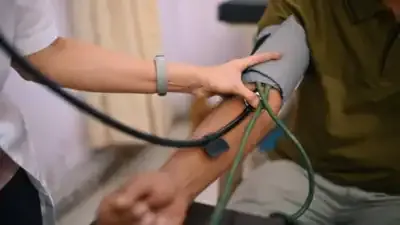
High blood pressure is also called hypertension, which happens when force of our blood pushing the walls is too high. When blood pressure is too high for longer period it will lead to injury to blood vessels leading to various issues like heart attack, brain stroke, vision loss, blockage of legs, kidney problems, aortic dissection which has tremendous impact on quality of life.
Normal blood pressure is below 120/80 mm Hg. If you’re an adult and your systolic pressure is 120to 129, and your diastolic pressure is less than 80,you have elevated blood pressure. High blood pressure is a systolic pressure of 130 or higher, or a diastolic pressure of 80 or higher, that stays high over time.
There isn't a cure for high blood pressure, but you can reduce your risk of heart disease, stroke, and kidney disease with lifestyle changes , medications and procedures.
Majority of time there are no symptoms for high blood pressure, it will be incidentally detected during health examinations. Many people are unaware that they have high blood pressure until it causes a serious issue like stroke. Regular check-ups ensure that hypertension is detected early before damage is permanent. Your doctor can also determine whether your high blood pressure is essential(age related) or due to an underlying conditions (secondary) such as kidney disease, blockages in blood vessels, hormone related disorders .
Hypertension is multifactorial disease, some are modifiable factors:
Avoid both first and secondhand smoking. There is no safe level of smoking when it comes to health. The moment you quit smoking heart and blood vessels will start healing. Within one year of quitting risk drops to half and within 5 years it drops to that of nonsmoker.
Avoid weight gain and maintaining healthy body weight. Even losing 5-10% of body weight causes significant blood pressure control. Aim for a body mass index (BMI) between 18.5 and 24.9 for optimal heart health. Focus on gradual, sustainable weight loss through healthy eating and regular exercise rather than extreme diets.
Avoid consumption of alcohol
Consume a diet that is low in saturated and trans fats and rich in fruits, vegetables, whole grains, and low-fat dairy products.
Limit sodium intake to less than 1.5gm per day.
Eat foods high in potassium such as bananas, avocados, cantaloupe, potatoes, and sweet potatoes. Aim for 3.5 to 5gm of dietary potassium per day
Increase physical activity. Exercise isn’t just for weight loss, it’s one of the most effective ways to lower blood pressure naturally. Engage in 150 minutes of moderate-intensity physical activity or 75 minutes of vigorous physical activity per week, or a combination of both, spread throughout the week. Include muscle-strengthening activities at least two days per week for added health benefits. Physical activity strengthens the heart making it more efficient at pumping blood and reducing the force on your arteries.
Chronic stress is hidden contributor to hypertension. Practice yoga, meditation, muscle relaxation exercises. Getting 7 to 9 hours of sleep daily. Spending time with loved ones provides emotional support and reduces stress. Even five minutes of daily mindfulness will calm your mind.
Blood pressure can fluctuate, which is why regular follow-ups are key. Your doctor will track your readings over time to see how your treatment is working. They can also review your home blood pressure logs and interpret trends that may not be obvious to you. Never stop or adjust medications on your own. doing so can lead to dangerous spikes in blood pressure or withdrawal effects. Getting evaluated by multiple health care professionals (cardiologist, neurologist, nephrologist, ophthalmologist, physician, endocrinologist) is important because hypertension can affect multiple organs.




